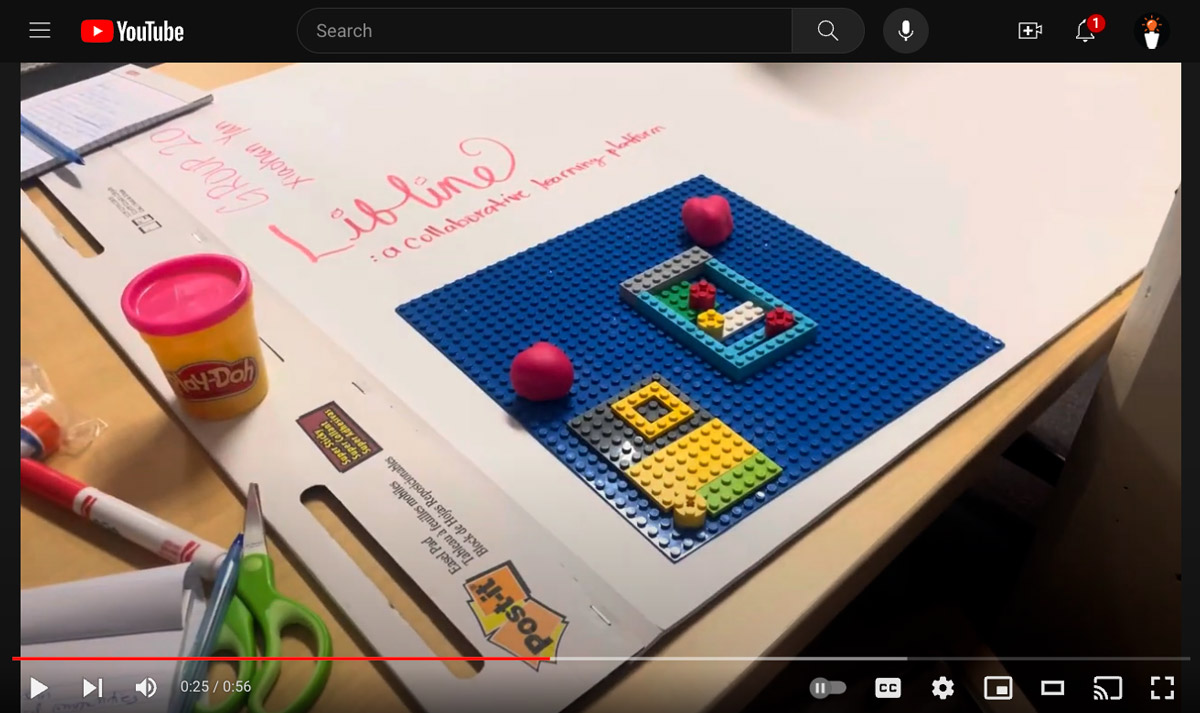LibLine: Bridging Gaps with an Online Mentorship App for Library Workers
Empowering Professionals in Under-Resourced Communities Through Borderless Connections
Addressing the challenge of facilitating career advancement for library workers in under-resourced communities, the team refined their problem statement to focus on the development of mentor relationships. Recognizing the pivotal role mentorship plays in professional growth, the solution proposed aims to make these valuable connections more accessible and effective.
How might we help library workers in under-resources communities develop mentor relationships to support them to advance their career pathways.
Introducing LibLine – A Digital Mentorship Solution:
1. Online Mentor-Match Application: At the core of the team’s proposal is “LibLine,” an innovative app designed to pair mentors and mentees across the library and information science (LIS) profession. This digital platform seeks to simplify the process of finding and establishing mentorship relationships by allowing users to self-select partners aligned with their career aspirations and needs.
2. Breaking Geographical Barriers: LibLine’s unique value proposition lies in its ability to transcend geographical limitations. By facilitating connections beyond local or regional boundaries, the app opens up a world of mentorship possibilities, connecting library workers from diverse communities and backgrounds, irrespective of their physical locations.
3. Professional Association Independence: Another significant feature of LibLine is its independence from specific professional associations. This inclusivity ensures that access to mentorship is not confined to membership in particular organizations, broadening the scope of opportunities for all library workers, especially those in under-resourced communities.
4. Focused on Individual Career Goals: The app prioritizes personal and professional development by enabling users to seek out mentors who can offer specific guidance and support tailored to their individual career goals. This personalized approach to mentorship increases the likelihood of meaningful and impactful relationships.
5. Facilitating Career Advancement: By providing a platform for robust mentorship connections, LibLine directly contributes to the career advancement of library workers. Mentorship is a proven catalyst for professional growth, offering insights, advice, and networking opportunities that can open doors to new possibilities and pathways in the LIS field.

The team’s presentation introduces a compelling and practical solution to a critical challenge faced by library workers in under-resourced communities. LibLine leverages technology to facilitate meaningful mentorship relationships that can significantly impact individuals’ career trajectories. By making mentorship more accessible and removing traditional barriers to connection, the app promises to foster a more inclusive, supportive, and empowered LIS professional community. This innovative approach not only aids in the professional development of individual library workers but also strengthens the overall resilience and vitality of the library profession.
Team 20 Members
Thanks to these project team members for their collaboration with DATALIS and their contributions towards innovating professional development.
• Xiaohan Yan
• Aislinn Sotelo
• Zemirah Ngow
Evaluate This Project
Please review the story and answer the five questions based on your knowledge, experience, and perspective. Your feedback will help us to innovate professional education that impacts recruitment, growth, and retention.
Implementation Roadmap
Phase 1: Planning and Development
- Conduct Needs Assessment
- Action: Identify the specific mentorship needs of library workers in under-resourced communities.
- Steps:
- Distribute surveys and conduct focus groups to gather insights into desired mentorship areas and potential challenges.
- Analyze data to inform the design and functionality of the LibLine application.
- Design the LibLine Platform
- Action: Develop a user-friendly application that facilitates mentor-mentee matching and communication.
- Steps:
- Define key features, such as profile creation, search filters, and messaging capabilities.
- Ensure the platform is accessible across various devices and internet connectivity levels.
- Prioritize user privacy and data security in the design.
Phase 2: Development and Testing
- Build the LibLine Application
- Action: Develop the application based on the defined design specifications.
- Steps:
- Collaborate with software developers to create the platform.
- Implement features that allow users to self-select mentors or mentees based on career goals and interests.
- Integrate communication tools to facilitate ongoing mentorship interactions.
- Pilot Testing
- Action: Conduct a pilot test of the application with a select group of users.
- Steps:
- Recruit participants from under-resourced library communities to test the platform.
- Collect feedback on usability, functionality, and overall experience.
- Identify and address any technical issues or areas for improvement.
Phase 3: Launch and Outreach
- Official Launch of LibLine
- Action: Roll out the application to a broader audience.
- Steps:
- Develop marketing materials to promote the platform to potential users.
- Partner with library associations and networks to increase awareness.
- Provide onboarding resources to help new users navigate the platform.
- Establish Support and Resources
- Action: Create a support system to assist users in maximizing the benefits of the platform.
- Steps:
- Develop guidelines and best practices for effective mentorship.
- Offer training sessions or webinars on utilizing the platform and engaging in meaningful mentorship relationships.
- Provide ongoing technical support to address user inquiries and issues.
Phase 4: Evaluation and Continuous Improvement
- Monitor and Evaluate Platform Usage
- Action: Track key metrics to assess the platform’s impact and effectiveness.
- Steps:
- Collect data on user engagement, mentorship pairings, and user satisfaction.
- Gather qualitative feedback through surveys and interviews.
- Analyze data to identify trends and areas for enhancement.
- Iterate and Enhance the Platform
- Action: Continuously improve the application based on user feedback and evolving needs.
- Steps:
- Implement updates to add new features or improve existing ones.
- Expand outreach efforts to include more diverse user groups.
- Explore partnerships with additional organizations to enrich the mentorship network.
Summary
Team 20’s proposal, LibLine, seeks to empower library workers in under-resourced communities by providing an accessible online platform for mentorship. By facilitating connections beyond geographical and organizational boundaries, LibLine aims to support professional development and career advancement. Implementing this initiative involves careful planning, user-centered design, thorough testing, and ongoing evaluation to ensure it effectively meets the needs of its users.
